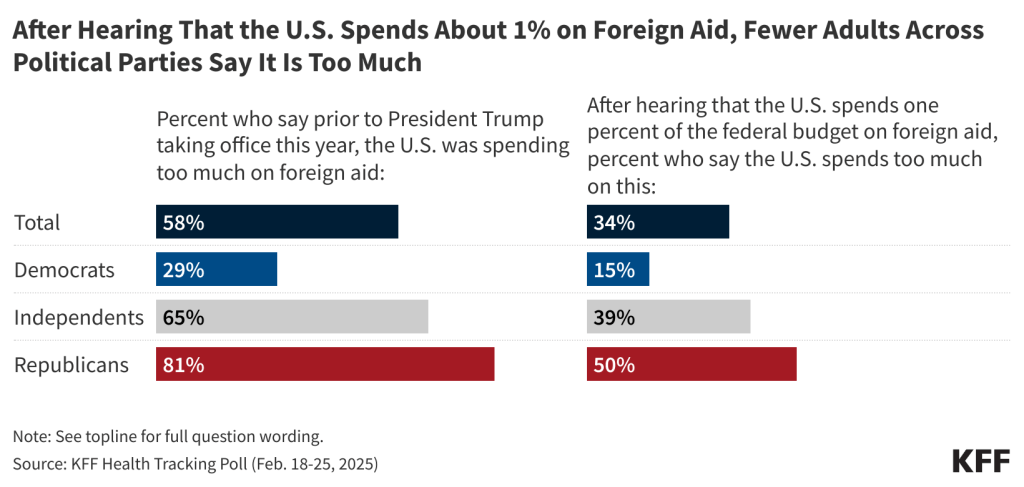
The independent source for health policy research, polling, and news.
Poll: Two Thirds Believe Dissolving USAID Will Lead to More Illness and Death Globally, While Nearly Half Say It Would Significantly Reduce the Budget Deficit and Fund Domestic Programs
Most of the Public Thinks Foreign Aid Accounts for a Much Larger Share of Federal Spending than It Does, and That Misperception Contributes to People’s Support for Budget Cuts
As the Trump administration works to dissolve the U.S. Agency for International Development (USAID), a new KFF poll finds that two-thirds (67%) of the public believe these actions will increase illness and death in low-income countries, and a similar majority (62%) believe it will result in more humanitarian crises around the world.
At the same time, nearly half of the public believe the dissolution of USAID will significantly reduce the U.S. budget deficit (47%) and allow funds to be redirected to domestic programs (47%).
Views on the impact of downsizing USAID divide sharply along partisan lines, with most Democrats and independents expecting more illness and death in low-income countries (91% and 69%, respectively), and most Republicans expecting positive impacts on domestic programs (72%) and the budget deficit (67%).
The poll also finds that most of the public grossly overestimates how much the federal government spends on foreign aid. When informed that it is actually about 1% of the federal budget, far fewer people say the U.S. spends “too much” on foreign aid.
About one in ten (11%) adults correctly estimate that 1% or less of the federal budget goes to foreign aid, with others guessing higher amounts, including more than half (54%) who guess more than 10%. On average, U.S. adults guess that foreign aid accounts for 26% of the federal budget.
When initially asked about the level of U.S. foreign aid prior to President Trump taking office, most say the country was spending “too much” (58%). After being informed that foreign aid accounts for about 1% of the federal budget, the share of the public who says that the U.S. spends too much on foreign aid drops more than 20 percentage points to one-third (34%).
This shift is similar across partisans. After hearing that only about 1% percent of the federal budget is spent on foreign aid, the share saying the U.S. spends too much drops to 50% among Republicans, 39% among independents, and 15% among Democrats.

The Public is More Supportive of Global Health Spending than Foreign Aid Overall
The poll also finds that half (50%) of the public believe the U.S. should play “the leading role” or “a major role” in efforts to improve health for people in developing countries. About a third (36%) say the U.S. should play a minor role in global health, while fewer (14%) say it should not play any role.
Republicans’ views on the role that the U.S. should play in global health have shifted since President Trump’s first term. In the most recent poll, one-third (32%) of Republicans say the U.S. should play at least a major role in improving the health of people in developing countries, down from about half in KFF polls in 2016 and 2018. At the same time, the share of Republicans who say the U.S. should take “no role” in global health has risen from 9% in 2016 to one in four (24%) now.
When asked about U.S. spending on global health, the public is more supportive than they are of spending on foreign aid generally. Nearly six in ten say that prior to President Trump taking office, the U.S. was spending either too little (19%) or about the right amount (37%) to improve health for people in developing countries, while about four in ten (43%) say the U.S. was spending “too much.”
Seven in ten adults say spending money on improving health in developing countries helps protect the health of Americans by preventing the spread of infectious diseases, including about nine in ten Democrats (86%) and two-thirds of independents (67%). Republicans are split, with half saying this spending helps Americans in this way (49%) and half saying it does not have much of an impact (51%).
Designed and analyzed by public opinion researchers at KFF. The survey was conducted Feb. 18-25, 2025, online and by telephone among a nationally representative sample of 1,322 U.S. adults in English and in Spanish. The margin of sampling error is plus or minus 3 percentage points for the full sample. For results based on other subgroups, the margin of sampling error may be higher.